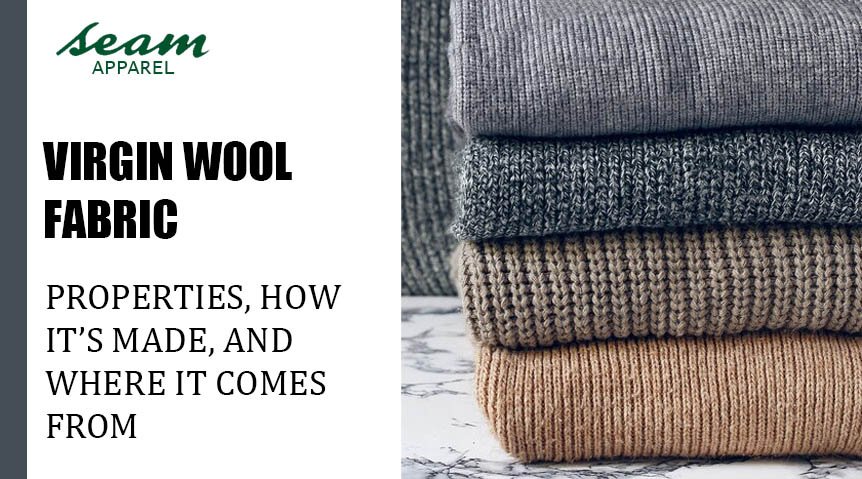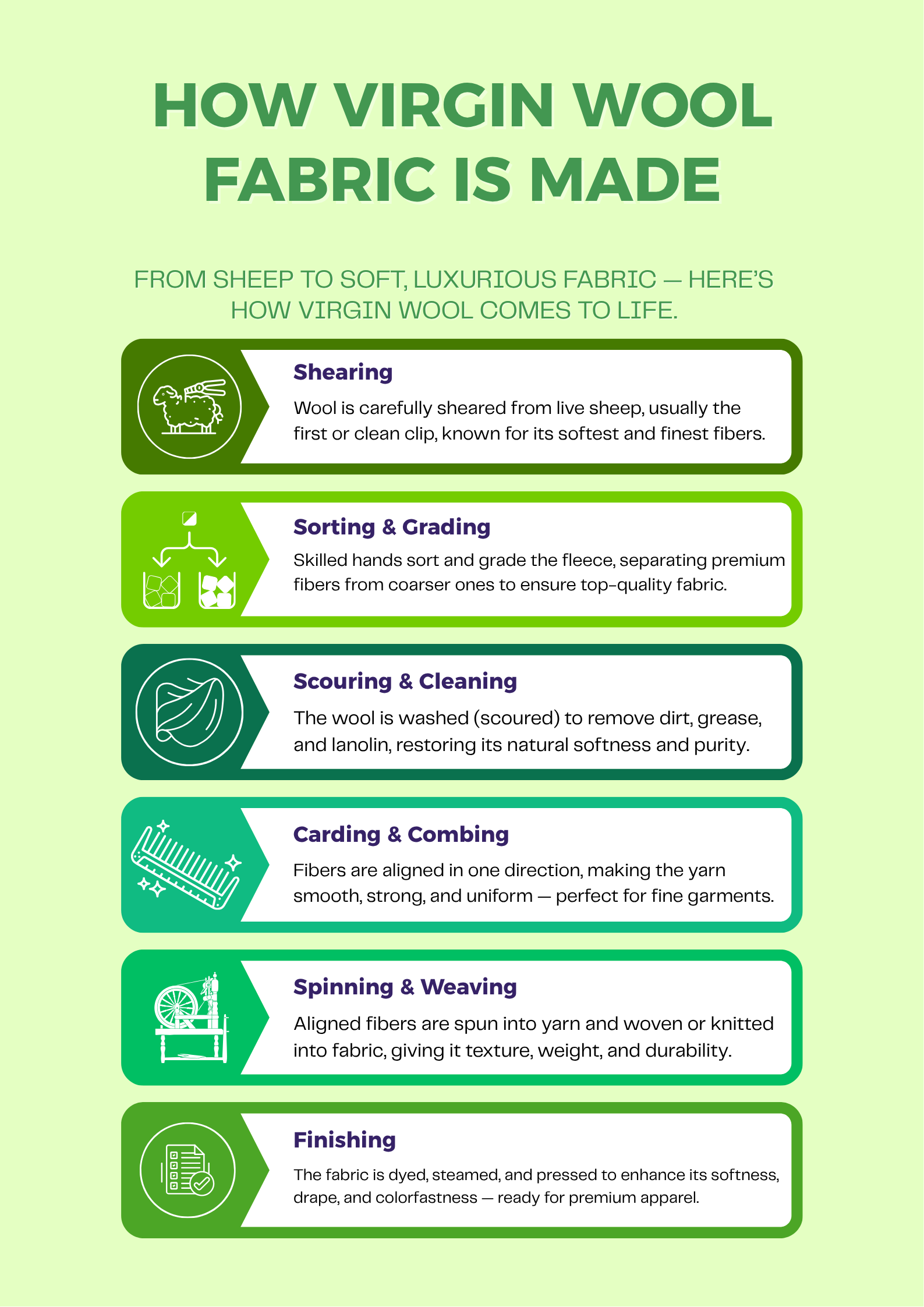What Is Denim Fabric? Properties, How It’s Made & Where It’s Used
Denim fabric is one of the most recognized textiles in the global...


Are you looking for luxury and premium wool for your brand?
Virgin wool fabric is one of the most premium and sought-after materials in the textile world. It is most known for its softness and natural elasticity. Virgin wool is a wool that is also well-known for its warmth. Moreover, it refers to wool that has never been processed, used, or recycled before. This makes it a “pure wool fabric” prized by luxury brands, fashion designers, and apparel manufacturers across the globe.
In fact, the global wool market is projected at USD 43.9 billion in 2025, underscoring the demand for high-quality wool materials.
For designers in the USA, virgin wool is a symbol of quality and authenticity. It stands out from recycled or blended wool because of its purity, strength, and comfort. From elegant coats to high-end suits, this fabric defines premium craftsmanship and long-lasting performance.
At Seam Apparel, we specialize in manufacturing custom wool garments, including those made from genuine virgin wool. Our team works closely with private labels, fashion startups, and established brands to produce superior-quality apparel that meets modern market demands while preserving traditional textile excellence.
Virgin wool, also called new wool, is the very first wool shorn from a sheep and spun into yarn. Unlike recycled wool, which comes from previously used garments or textile waste, virgin wool is completely untouched and unprocessed.
In the textile industry, “virgin” refers to the purity and originality of the fibers. These fibers are longer, cleaner, and more elastic than recycled alternatives, resulting in a smoother and softer fabric. Virgin wool maintains its natural lanolin coating, which enhances comfort, moisture resistance, and durability.
The purity of virgin wool matters because it directly influences the feel, strength, and longevity of the final garment. For brands aiming to deliver premium-quality clothing, using virgin wool fabric ensures a product that stands out in both performance and value.
Virgin wool fabric offers an exceptional balance of softness, warmth, and resilience. Its natural properties make it one of the most versatile and functional textiles available today.
Virgin wool is incredibly soft to the touch. Since the fibers are new and unprocessed, they lack the coarseness often found in recycled wool. This makes it ideal for garments worn close to the skin, such as sweaters, scarves, or high-end suiting.
Wool has natural insulating properties. Virgin wool keeps you warm in cold weather and cool in milder temperatures. The fibers can absorb up to 30% of their weight in moisture without feeling damp, making it breathable and comfortable throughout varying climates.
The natural crimp in virgin wool fibers gives the fabric elasticity and shape recovery. This means garments made from virgin wool resist wrinkles and retain their structure even after long wear—an advantage especially valued in tailored clothing.
Wool naturally wicks away moisture from the skin and resists odor build-up, keeping garments fresh for longer wear. These qualities make virgin wool suitable for performance wear and everyday apparel alike.
Virgin wool is strong and resilient, able to withstand years of use without losing its integrity. It’s also naturally flame-resistant, providing additional safety and comfort benefits.
Being 100% natural, virgin wool is fully biodegradable and renewable. It’s an excellent choice for brands prioritizing sustainability without compromising on quality.
The process of making virgin wool fabric involves multiple stages, each ensuring that the fibers maintain their purity and natural quality.


The process begins with carefully sharing live sheep to collect their fleece. Virgin wool typically refers to the first or clean clip, which provides the finest and softest fibers.
Once shared, the fleece is sorted and graded. Skilled workers separate the highest-quality fibers from coarser sections, ensuring only the best wool goes into premium fabrics.
The raw wool is washed (scoured) to remove dirt, grease, and lanolin. This step restores the fiber’s softness and prepares it for further processing.
The fibers are then carded and combed to align them in one direction. This makes the yarn smoother, stronger, and more uniform. Making it ideal for fine-textured garments.
The aligned fibers are spun into yarn and woven or knitted into fabric. The weaving technique determines the final texture, weight, and appearance of the fabric.
Finally, the fabric undergoes finishing treatments like dyeing, steaming, and pressing to enhance softness, drape, and colorfastness.
Virgin wool is produced in several key regions across the world, with each area known for distinct fiber qualities.
Each region’s climate, sheep breed, and farming techniques influence the wool’s texture and strength. Historically, wool production was concentrated in Europe, but modern demand has made Australia and New Zealand leading sources of premium virgin wool.
Also check our blog on: Types of Leather: A Complete Guide for Brands and Consumers.
Virgin wool fabric is synonymous with luxury, purity, and performance, making it one of the most desirable materials for fashion designers and apparel brands worldwide. It represents craftsmanship, comfort, and sustainability all in one — qualities that define high-end and long-lasting garments.
Because virgin wool has never been processed, reused, or blended, it retains the full integrity of its natural fibers. This purity results in smoother, longer, and stronger strands that create a refined texture and exceptional durability. Unlike recycled wool, which may contain shorter or mixed fibers, virgin wool maintains a consistent quality that elevates the final garment’s appearance and feel.
The natural softness of virgin wool fabric makes it incredibly comfortable for daily wear. Its fibers have a fine diameter that feels gentle on the skin, preventing the itchiness often associated with lower-grade wool. The material also breathes well, wicking moisture away from the body to keep wearers cool and dry in varying temperatures. For designers creating luxury suiting, knitwear, or outerwear, this level of comfort is a key differentiator.
Virgin wool is remarkably resilient. Its natural elasticity allows garments to retain their shape, resist wrinkles, and recover from creasing. This means that coats, suits, and sweaters made from virgin wool not only look new for longer but also withstand years of use without losing structure or softness. It’s a smart investment for consumers and a reliable material for brands focused on longevity.
As a renewable and biodegradable fiber, virgin wool aligns with the growing movement toward eco-conscious fashion. Sheep naturally produce new fleece each year, making wool a sustainable resource when ethically sourced. In addition, virgin wool garments have a longer lifespan, reducing waste and the need for frequent replacements. For environmentally aware brands, using virgin wool reflects both quality and responsibility.
Virgin wool’s versatility is another reason for its popularity. It can be woven or knitted into a variety of fabrics — from lightweight suiting materials to thick, warm coatings. Designers use it to craft everything from tailored blazers and formal trousers to cozy knitwear and modern streetwear. Its ability to adapt across styles and seasons makes it a core fabric in both traditional and contemporary fashion collections.
When compared to recycled or blended wool, virgin wool stands out for its softness, resilience, and superior structure. For brands developing premium or luxury apparel collections, it offers unmatched value. Thus, ensuring every garment looks refined, feels comfortable, and lasts for years.
At Seam Apparel, we recognize the timeless appeal of virgin wool. Our expert team collaborates with designers and private labels to turn this exceptional fabric into garments that combine elegance, performance, and sustainability.
To better understand the value of virgin wool, here’s a quick comparison with other common types of wool used in the apparel industry: Merino wool and Recycled wool. This overview highlights how virgin wool stands out in terms of softness, durability, and sustainability.
| Feature | Virgin Wool | Merino Wool | Recycled Wool |
|---|---|---|---|
| Source | First shearing from a sheep; never processed or reused | From Merino sheep; known for ultra-fine fibers | Made from reclaimed or used wool garments |
| Softness & Comfort | Exceptionally soft and smooth due to unprocessed fibers | Extremely soft and fine; ideal for sensitive skin | Coarser texture due to mixed, shorter fibers |
| Durability | Strong, elastic, and long-lasting | Soft yet slightly less durable than virgin wool | Less durable; fibers break down faster |
| Thermal Regulation | Excellent insulation and breathability | Superior warmth with moisture control | Moderate warmth; less breathability |
| Eco-Friendliness | Renewable and biodegradable | Renewable and biodegradable | Sustainable through waste reduction but lower in quality |
| Best Used For | Luxury coats, suits, and outerwear | Performance wear, base layers, and fine knitwear | Budget-friendly and casual garments |
This comparison shows that virgin wool offers the best balance of quality, comfort, and strength, making it a preferred choice for premium and luxury apparel.
Seam Apparel being a private label manufacturer, we understand the craftsmanship required to produce garments from premium fabrics like virgin wool. Our team sources high-quality virgin wool from trusted global suppliers and transforms it into refined apparel for fashion brands, private labels, and designers across the USA.
We offer:
Our advanced manufacturing setup allows small-batch production as well as large orders, ensuring flexibility without compromising quality. Whether you’re developing a luxury coat line or timeless wool suits, Seam Apparel can help turn your vision into reality.
Virgin wool fabric represents the finest standard in natural textiles. Thus, offering unmatched softness, warmth, and sustainability. From traditional tailoring to modern streetwear, its timeless appeal continues to inspire designers and brands worldwide.
If you’re seeking custom virgin wool garment manufacturing or exploring private label wool production, Seam Apparel is here to assist. Our expertise in handling premium fabrics ensures every piece reflects excellence, comfort, and durability.
Contact Seam Apparel today to discuss your next virgin wool collection or request a quote for your custom garment project.